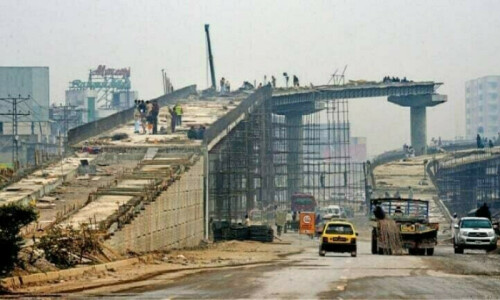RIYADH, Dec 1: The Opec meeting in Abu Dhabi next week could have phenomenal impact on global crude dynamics. The cartel is expected to discuss opening up its taps further, whereas, the issue of de-pegging oil sales from dollar would also be under the hammer.
Hardly a week ago $100/barrel seemed imminent. Today the possibility seems fading. Even a fire in pipeline carrying crude to the US from its largest exporter, Canada, could not sustain the bull-run.
The US imported 10.3 million barrels a day last week. Crude prices jumped for a while, by almost $4, but then took a U-turn. Prices in New York fell below $90 on Friday. Strange indeed are the dynamics of the crude world.
Speculators seem to be taking a cue from signals that Opec was about to open taps further, taking steam out of the crude markets. This happened despite the US crude oil stockpiles falling 452,000 barrels to 313.2 million last week. Oil inventories in Cushing, Oklahoma, were at 15.2 million barrels as of November 23, the lowest since October 2005.
Opec is definitely under pressure to increase output. Opec production was already rising faster than expected. Opec total output would probably be 31.6 million barrels, 1.1 per cent higher in November, preliminary estimates by PetroLogistics Ltd said. Saudi Arabia is producing at the highest level in the year — nine million barrels per day.
And in the meantime, the clamour within Opec for de-pegging the oil receipts with dollar seem to be growing. Opec finance ministers are meeting in the UAE this week and one of the major issues would be the dollar peg.
While there was no mention to the issue of currency in the Riyadh Opec communiqué, yet the issue generated quite a heat behind the scene. Declining dollar is a cause of concern to virtually everyone, be they doves or hawks.
In the wake of galloping inflation in the region, leaders of the Gulf Arab states are faced with mounting pressure either to end their currencies’ peg to a sliding dollar or revalue.
The Arab Monetary Fund, sponsored by 22 Arab states, has called on the Gulf Arab states to drop their pegs to the US dollar, Fund Chairman Jassem Al-Mannai said.
He suggested switching to a managed float or peg their currencies to a basket, including the euro, sterling and yen, UAE newspaper Emarat al-Youm reported.
A summit next week of Gulf rulers would also discuss and debate the future of the exchange-rate policies. The UAE, the largest Arab economy after Saudi Arabia, called this month upon all Gulf oil producers to switch from fixed exchange rates to currency baskets.
Kuwait in May became the first in the GCC to move away from the dollar, reverting to a basket of currencies with the aim of fighting high inflation.
Around 90 percent of public revenues in the GCC countries - Bahrain, Kuwait, Oman, Qatar, Saudi Arabia and the United Arab Emirates (UAE) — come from oil, which is priced in dollars.
Saudi Arabia pegged its riyal to the dollar in 1986 and most other countries made the link to the greenback more than 14 years later in preparation for a Gulf monetary union and a single currency.
The issue of ending the link to the dollar has gained urgency after the US Federal Reserve cut interest rates twice in recent weeks to stimulate a slowing US economy, leaving the Gulf in a dilemma.
”Whilst the US is cutting interest rates in response to a slowing economy, the Gulf needs a tighter monetary policy to curb inflation,” Standard Chartered Bank said in a report.
Not all countries, however, agree with this assessment, as some believe moving away from the dollar will not be a magical remedy for economic ills.
The International Monetary Fund (IMF) also believes that de-pegging Gulf currencies from the dollar will not reduce inflation as price pressures are mostly domestically generated. “These countries don’t believe that inflation is imported. I think they are right.
Seventy per cent of their imports are priced in dollars... They don’t stand to gain very much” from de-pegging their currencies, IMF Middle East and Central Asia chief Mohsen Khan said last month.
















































Dear visitor, the comments section is undergoing an overhaul and will return soon.